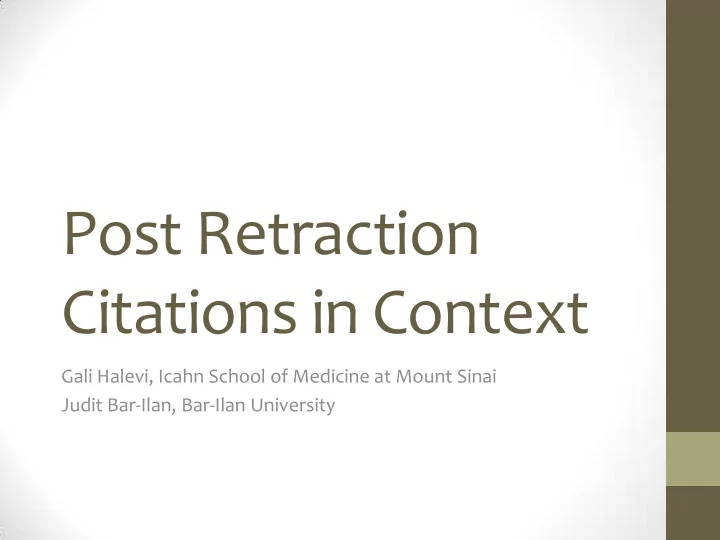

Post Retraction Citations in Context Gali Halevi, Icahn School of Medicine at Mount Sinai Judit Bar-Ilan, Bar-Ilan University
THE NUMBER OF RETRACTIONS IS ON THE RISE
Figure 2. Proportion of journals issuing corrections or retractions amongst all journals covered by the Web of Science database, by year. Fanelli D (2013) Why Growing Retractions Are (Mostly) a Good Sign. PLoS Med 10(12): e1001563. doi:10.1371/journal.pmed.1001563 http://journals.plos.org/plosmedicine/article?id=info:doi/10.1371/journal.pmed.1001563
Background • There are two types of citations to retracted articles: Citations that a retracted article received prior to its retraction and citations that are received post retraction and despite retraction notices. • In this study we sought out to find the context around post-retraction citations with the main purpose of finding out whether they are negatively, positively or neutrally mentioned.
Data Collection • ScienceDirect, Elsevier’s full text database was accessed in October 2014. The database was queried for the term “RETRACTED” in the article title and its retraction notice. • For this study we selected the five top articles that were found to be highly cited since 2015. This ensured that the papers all cite retracted articles • A total of 1,203 results retrieved from which 988 were retracted articles. The results excluded were retraction notices, duplicates and papers whose original titles included the word "retracted".
Case study • For each article we extracted the citing documents and analyzed the ones appearing in 2015 and 2016. Overall, we analyzed 120 citing documents. • Each mention was categorized as follows: • Positive: A positive citation indicates that the retracted article was cited as legitimate prior work and its findings used to corroborate the author/s current study. • Negative: A negative citations indicates that the authors mentioned the retracted article as such and its findings as inappropriate. • Neutral: A neutral citation indicates that the retracted article was mentioned as a publication that appears in the literature and does not include judgement on its validity.
EXAMPLES
Séralini, G. E., Clair, E., Mesnage, R., Gress, S., Defarge, N., Malatesta, M., & De Vendômois, J. S. (2012). RETRACTED: Long term toxicity of a Roundup herbicide and a Roundup-tolerant genetically modified maize. Food and chemical toxicology , 50(11), 4221-4231. • This article discusses the relationship between GM foods and cancerous tumors in animals. • This article, published in 2012 was the subject of a debate surrounding the validity of the findings, use of animals and even accusations of fraud. • Its publication and retraction process have resulted in the “ Séralini affair” which became a big media news item and created a social movement against GM food
Citations in Context 8 • This article was cited 109 times 7 Number of citing articles 2015-2016 7 since its publication in 2012 with 6 28 citations tracked after 2014 6 5 5 • More citations are seen to be 5 negative, the positive and neutral 4 ones are also present • The negative citations mostly 3 point to the media frenzy around 2 the results. • The study was republished in 2014 1 by Environmental Sciences 0 Europe. The republished article NA Negative Neutral Positive received 17 citations in 2015 and 2016. The vast majority of them being positive mentions
Mukherjee, S., Lekli, I., Gurusamy, N., Bertelli, A. A., & Das, D. K. (2009). RETRACTED: Expression of the longevity proteins by both red and white wines and their cardioprotective components, resveratrol, tyrosol, and hydroxytyrosol. Free Radical Biology and Medicine , 46(5), 573-578. • This article discusses the benefits of resveratrol for longevity • The leading author of the paper, Dipak Das and his lab at the University of Connecticut Health Sciences Center were the subject to an ethical investigation by the university. • The results of the university’s investigation led to the retraction of all of Dr. Das' papers due to scientific misconduct and data manipulation. • The article, which was retracted in 2012, received 85 citations since its publication in 2009, 21 of which occurred in 2015 through March 2016. • The vast majority of citations are positive , quoting the article’s findings as legitimate.
Walumbwa, F. O., Wang, P., Wang, H., Schaubroeck, J., & Avolio, B. J. (2010). RETRACTED Psychological processes linking authentic leadership to follower behaviors. • This article develops the concept of The “authentic leadership” • This article was retracted in 2014 due to serious data manipulation and falsification. • The article continued to be cited despite the lengthy and detailed retraction notice. • A close examination of the post retraction citations (2015- March 2016) shows that all citations were positive citations, meaning that the citing authors used findings from this article to support their findings. • The subject of “authentic leadership” is popular in management studies and has seen a surge in publications since 2012. This could explain the overall positive citations of the article.
Conclusions • Retracted articles continue to be cited years after retraction and despite retraction notices being posted on publishers’ platforms. • This could be the result of general interest by the public or media. • In other cases, the reason for retraction does not deter others from citing the article. • We recommend that publishers use reference checks to all submitted articles to detect citations of retracted articles and remove them or at least request an explanation from the authors for citing a retracted paper in a positive or neutral manner
Thank you Questions? Contact: Gali Halevi: gali.halevi@mssm.edu JuditBar-Ilan: Judir.Bar-ilan@biu.ac.il
Recommend
More recommend